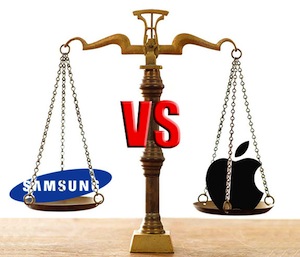Since the verdict was passed down on Friday in the Apple vs. Samsung patent case, arguments have been flying around explaining how the result will either fuel or cripple innovation. The case has certainly set a precedent for patent disputes in the future – that much is clear. But how can we really expect it to affect the future of tech product development?

There are compelling things to say on both sides of this issue. Here’s our analysis.
It’s a Gift
The billion dollar ruling in Apple’s favor seems harsh at first glance – but there’s a strong case to be made that this will actually be good for innovation in the long run. Instead of sitting back and making their phones and tablets look and feel similar to the iPhone and iPad, Samsung and others will now have to do some work. The hardware and software will have to be different, unique and innovative.
It’s not about Apple having a monopoly on “rounded rectangles.” In fact, the patents that Samsung was found to violate didn’t have anything to do with rounded rectangles – they had to do with software design, button placement, and the overall physical similarities between their products and Apple’s.
If companies can no longer get away with having products heavily “inspired” by Apple’s ideas, perhaps they’ll come up with some great ideas of their own – maybe even force Apple to step up their own product development to compete!
Hopefully this will inspire not just Samsung, but many other companies (especially Android device makers) to shy away from “me too” products, and avoid mimicking others’ designs, and instead focus on their own unique and innovative product lines.
Encouraging greater creativity and innovation is not only good for consumers (as it results in greater competition and better products) – it’s also good for the future of technology as a whole. I don’t want to live in a world littered with endless “me too” products, because companies couldn’t bother to truly apply themselves to making better products.
Better products. Not just cheaper, shinier, and more like the competiton.
It’s a Curse
One of the popular arguments making its way around the Internet since Apple won its patent infringement lawsuit over Samsung is that the verdict will stifle innovation. Samsung used the argument in its statement addressing the loss: “It will lead to fewer choices, less innovation, and potentially higher prices.”
While Samsung is clearly biased on the matter, there is something to be said for their argument. Patent disputes turn focus (and funds) away from product development, and can damage relationships between companies who might otherwise benefit from sharing ideas and working together.
It’s also true that some of Apple’s patents are concerningly broad, and perhaps shouldn’t be defended (although that’s not true of all, or even most of them). Even so, there’s a difference between infringing some patents and openly copying a product’s hardware and software design – it’s unique look and feel.
The trouble is that some companies will use overly broad patents to bully the competition, patenting ideas not because they’re unique and innovative, but because they want to cash in on licensing fees or harm their competitors.
Another possible consequence is that Apple’s legal victory will spawn a new wave of patent trolls (such as Proview), suing companies to collect a payout on ideas and trademarks that they aren’t actively using, and that don’t harm them if competitors violate.
Wrapping it Up
Apple’s win will prevent Samsung and others from ripping off their designs (which they spend years, and a lot of cash to develop). The ruling does not prohibit Samsung or anyone else from continuing to innovate, however. They can still release as many products as they want, for whatever prices they want to offer them at.
Samsung is using this as a way to scare people over to their side. Samsung brought this on themselves by knowingly (and blatantly) copying Apple’s designs – even after they were specifically and repeatedly warned by Steve Jobs, Apple, Google, and even their own employees not to. In fact, I maintain that this decision should lead to more innovation, not less.
If Samsung is forced to stop copying Apple, there is only one option left — innovate. Samsung’s statements have repeatedly claimed that “Samsung will continue to innovate.” So stop threatening to innovate, Samsung, and actually do it! Careful research, unique designs, and original products are the answer. Innovation, not immitation.
Enforcing design patents is unlikely to cripple innovation unless product developers simply give up on the idea of making new, unique, and innovative products – and I’d like to think that hasn’t happened yet. Forcing companies to work around design patents is a great way to encourage them to think outside the box!
Apple’s victory won’t kill Samsung (Samsung still has plenty of money, and forward momentum). It won’t kill Android. It won’t cripple the future of product design, or unique, compelling, and competitive products. It will, however, kill cheap copycat devices.
In the past, I’ve argued that patent wars only hurt consumers. I still believe that to be true – but the real problem is that the patent wars exist. If companies simply developed their own products and weren’t so focused on trolling other companies for licensing essential patents, that wouldn’t be the case.
It’s easy to steal other people’s designs, and difficult to design unique and innovative products – but it’s the right thing to do, and that should count for something. A world filled with innovation, strategy, and intense (yet fair) competition. That’s the sort of world I want to live in. That’s the future I hope to see.
What are your thoughts? Sound off in the comments!


